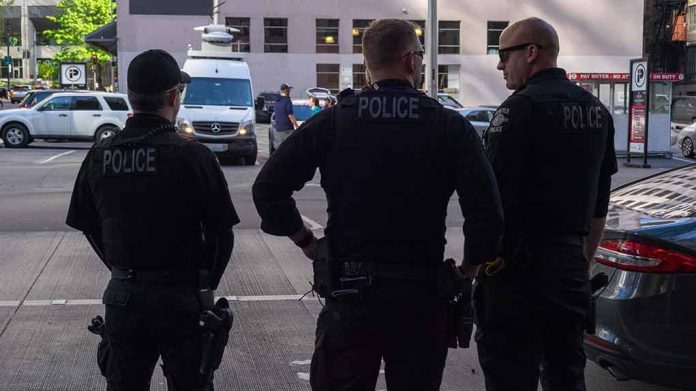
Federal judge dismisses charges against Atlanta officer Sung Kim in the 2019 fatal shooting of Jimmy Atchison, ruling it “textbook self-defense” despite years of prosecution and community outrage.
Key Takeaways
- U.S. District Judge Michael Brown dismissed all charges against former Atlanta officer Sung Kim, citing “overwhelming” evidence of self-defense in the 2019 shooting death of Jimmy Atchison.
- Kim found Atchison, wanted for armed robbery, hiding in a closet during an arrest operation and fired one fatal shot when he believed Atchison was reaching for a weapon.
- The judge’s ruling was based on Supremacy Clause immunity and self-defense, questioning why Georgia prosecutors pursued charges for over two and a half years.
- The case sparked policy changes in Atlanta, including the police department’s temporary withdrawal from federal task forces due to the lack of body cameras.
- Atchison’s family and civil rights advocates have expressed disappointment with the ruling, with the Georgia NAACP calling for an appeal.
Judge Rules Officer Kim Acted in Self-Defense
In a decisive victory for law enforcement, U.S. District Judge Michael Brown dismissed all criminal charges against former Atlanta police officer Sung Kim in the 2019 shooting death of Jimmy Atchison. The ruling, which cited “textbook self-defense,” ends a controversial legal battle that had dragged on for over two and a half years. Kim faced serious charges including involuntary manslaughter, felony murder, and aggravated assault after shooting Atchison, who was hiding in a closet while fleeing from law enforcement during an arrest operation for armed robbery.
“The evidence for self-defense is so overwhelming it is hard to understand how Georgia could have brought these charges in the first place, much less continued with them over the two and a half years since. Defendant’s shooting of Mr. Atchison was textbook self-defense,” said U.S. District Judge Michael Brown.
Judge Brown’s ruling emphasized that officers repeatedly called for Atchison to reveal himself before the confrontation, but he failed to respond. When Kim discovered Atchison hiding in a closet, the officer believed the suspect was armed and fired a single fatal shot after Atchison allegedly made movements perceived as threatening. The court determined that Kim’s belief that Atchison posed an imminent threat was reasonable under the circumstances, regardless of whether a weapon was actually visible.
Legal Basis for Dismissal Sparks Controversy
The charges against Kim were dismissed on two legal grounds: Supremacy Clause immunity, which protects federal officers from state prosecution for actions taken in the course of their duties, and self-defense immunity. At the time of the incident, Kim was serving on an FBI fugitive task force, which allowed him to move his case from state to federal court. This jurisdictional shift proved crucial to the outcome, highlighting the complex legal protections afforded to local officers serving on federal task forces.
“Nothing required the defendant to hold off shooting until he literally saw a gun in Mr. Atchison’s hand. He had a reasonable belief Mr. Atchison was armed and was going to shoot him. That is all that matters,” said U.S. District Judge Michael Brown.
Kim’s attorney, Don Samuel, celebrated the decision while acknowledging the tragedy of Atchison’s death. The defense team had sought dismissal of the charges earlier this year, arguing that the prosecution constituted an abuse of discretion. Samuel pointed out that the judge’s ruling vindicated their position that Kim acted appropriately under threatening circumstances that demanded split-second decision-making. The officer retired from the Atlanta Police Department several months after the shooting.
Community Response and Policy Implications
The dismissal has reignited tensions between law enforcement supporters and civil rights advocates. Atchison’s family expressed profound disappointment, having previously hoped for justice following Kim’s indictment in December 2022. The case had been highlighted by activists as an example of police violence against Black individuals, a narrative that has fueled nationwide calls for police reform despite evidence supporting the officer’s actions in this specific incident.
“This ruling is not just a blow to the Atchison family’s pursuit of justice — it’s a threat to civil rights and public safety across the nation,” said Gerald Griggs.
The incident did prompt significant policy changes within the Atlanta Police Department, which temporarily withdrew from federal task forces due to concerns about the lack of body cameras during joint operations. This policy shift underscores the ongoing challenge of balancing effective law enforcement with transparency and accountability measures. The Georgia NAACP has called for an appeal of Judge Brown’s ruling, arguing that it undermines civil rights protections and public safety standards, though legal experts suggest the comprehensive nature of the judge’s opinion makes a successful appeal unlikely.














